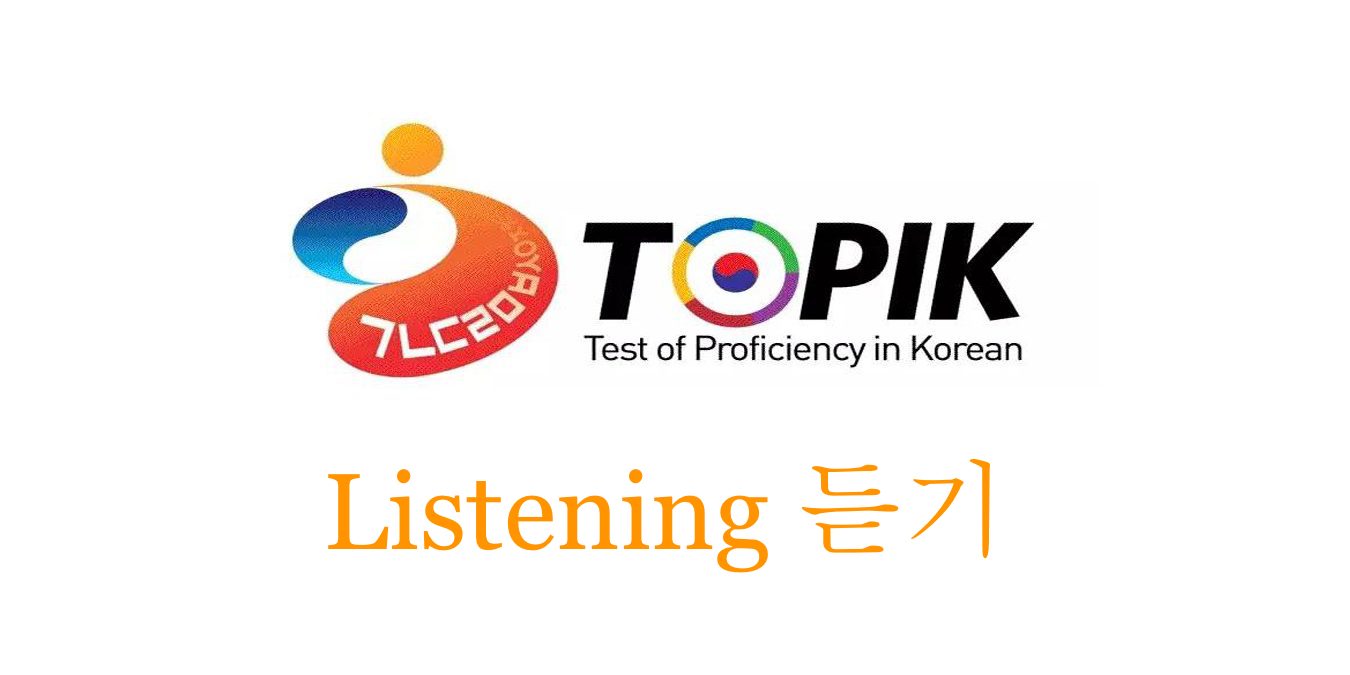Just like reading(읽기), listening(듣기) is easy to prepare for. Basically, it is ok that you just only practice the past TOPIK Listening (듣기) questions over and over. Of course, there are other ways to raise the score. This time, I will introduce you some tips for getting as many points as possible, and some measures to improve listening skills.
Preparing for TOPIK 듣기(Listening)
Know what TOPIK 듣기(Listening) requires
As mentioned in TOPIK Reading(읽기), it is important to know about the TOEFL test itself if you want to increase your TOEFL score.
Tips for Listening(듣기)
- Focus on information explained in-depth – TOPIK requires greater understanding for contents than detail
- Be an active listener – listen only to what you really need with actual purpose
- Focus on the enemy – ignore noise and others, focus only on listening
- Identify the question type – depending on the type of questions, the answers can be identified to some extent
- Time management for each question – to increase the efficiency of the answer to the questions
- Use additional materials – not only solve the TOPIK past, but also study through a variety of materials, sites, and other media.
- Track your progress – motivating you by visualizing what you have achieved and what you have learned
- Looking for a teacher who has good ability for Korean – Getting feedback facilitates learning Korean
Memorizing words + connecting the word with the sound
If you just memorize words and take the listening test on the day of TOEFL, you will get stuck 100%. Even if you can read or write words just by memorizing it, recognizing the sound of the word with your ears is a different story.
When you memorize words, it is highly recommended to learn Sino-Korean because about 60% of Korean is composed of Sino-Korean.
Example 学生-학생 生活-생활 活発-활발 発達-발달 達人-달인
Sino-Korean and Korean match the same number of characters as above. If you speak Japanese as your native language, you may have noticed that it is just converting Sino-Korean into Korean Hangul. Therefore, it is easy for Japanese to learn Korean because they only need to learn which Chinese characters are converted into Korean.
If your native language is not Japanese, you will have a hard time memorizing Korean words. Japanese people start learning Chinese characters at the age of six, so it is relatively easy to learn Korean because of the advantages of learning Korean. But you don’t have to be disappointed. I have a way to recommend it to those who don’t speak Japanese. Below is an example.
Example 学生-학생 生活-생활 活発-활발 発達-발달 達人-달인
학(学) – learn + 생(生) – alive or -er = a student (a leaner)
생(生) – alive or -er + 활(活) – energy = life or living
활(活) – energy + 발(発) – emit = activeness
발(発) – emit + 달(達) reach = development
달(達) reach + 인(人) a person = a master or an expert
In this way, kanji has several meanings in one letter. Let’s memorize the kanji words one by one by matching the meaning and kanji. It takes time, but your Korean ability will definitely improve. Also, when memorizing words, keep in mind the following :
- Using of five senses as much as possible
- Memorizing words through images and illustrations rather than characters
- Linking words with the sound
- Repeat the vocabulary book at least three to five times.
- To actively say the words you memorize or write an essay to make output
When I learned words, I used vocabulary books a lot. I used to use three vocabulary books before taking the TOPIK, and I did four times of all three books. A vocabulary book will have a tremendous effect only by repeating it.
I also learned words by listening voices and writing essays, because I was able to combine words with the sounds and was able to get feedback from my native friends by using the words in my essay to output them.
Solving past questions
It’s not a bad way, but keep in mind that it’s just a way. The most important thing in Korean is how many Korean words you learned before the test. I think there are advantages to solving past questions, but there are a few points to keep in mind.
- Don’t try to memorize Korean words in past questions – if you want to, open a vocabulary book
- Don’t just solve it blindly, but solve it with a clear purpose. – For example, what kind of questions you often make mistakes, what are the keywords in a sentence, etc.
Again, Reading(읽기) is relatively easy to prepare, so if possible, focus on memorizing as many Korean words as possible, rather than trying to solve too many past questions.
Below is a Youtube account called Topik 3급 with a lot of past questions on 읽기(Reading)、듣기(Listening)、쓰기(Writing). Please use it for learning Korean (^◇^)
In the end
The above content can be applied not only to Korean study but also to other languages, so please make use of it! I would appreciate it if you could leave a comment if this article was helpful for TOPIK study or if you thought your language learning method was like this (о´∀`о)

References – YouTube.com
thumbnail – wiki-study.com



Comment